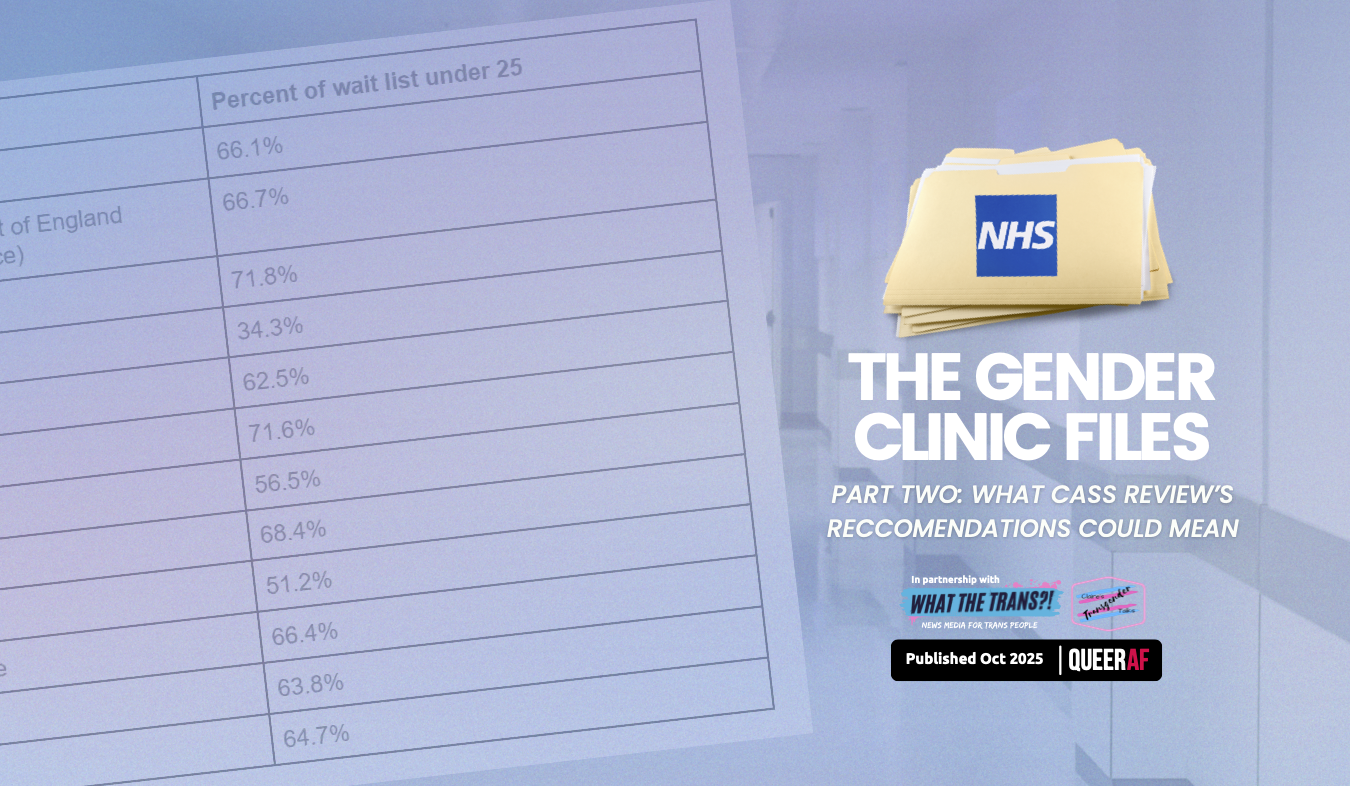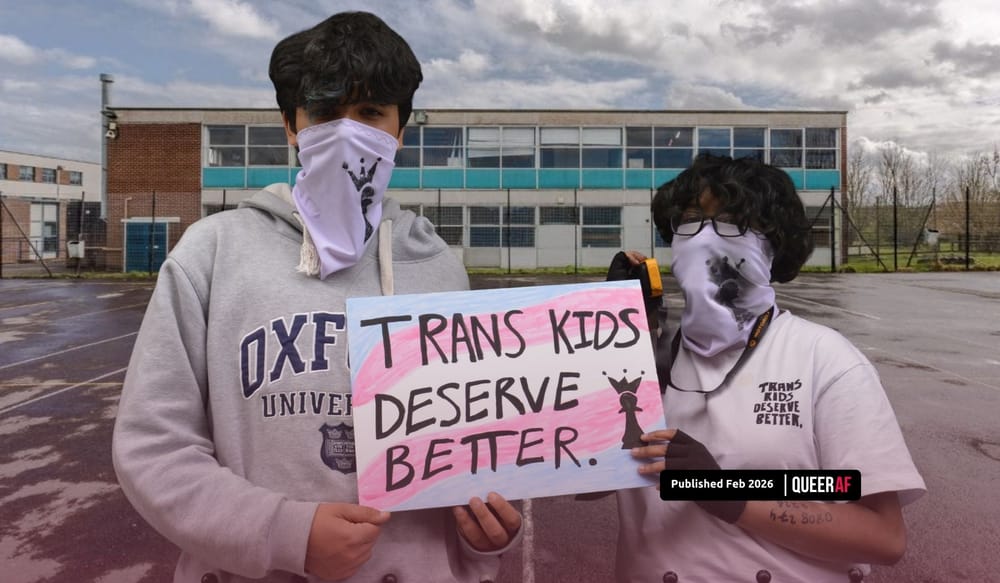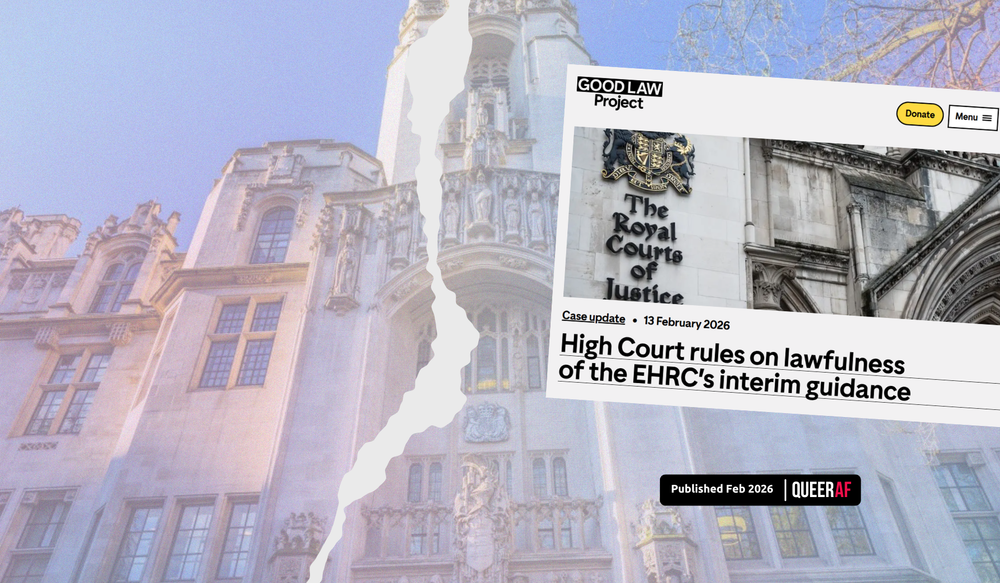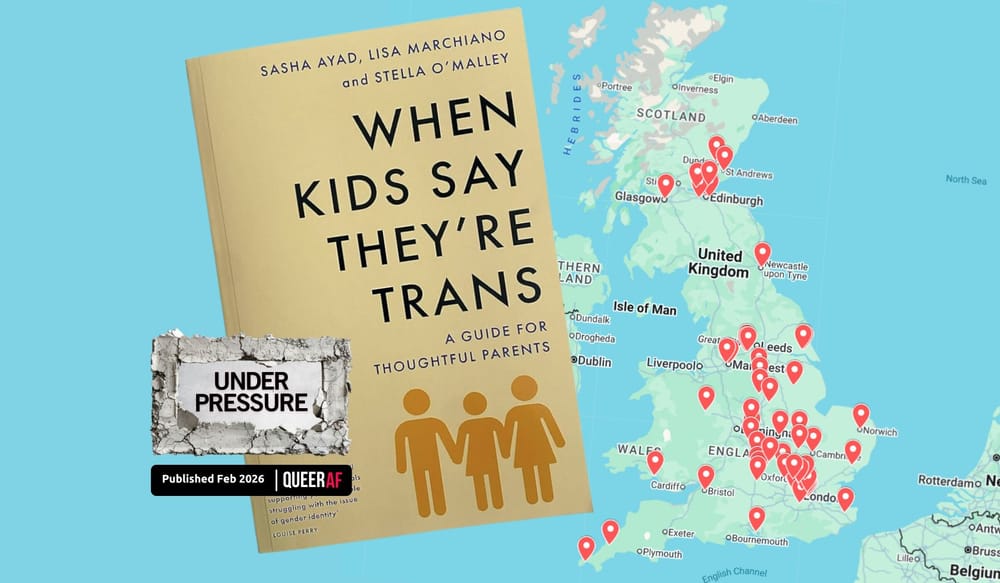
TL;DR: If the Cass Review’s recommendation to change the system of Trans+ healthcare for under 25-year-olds is implemented, two-thirds of the current waiting lists for GICs could be wiped out, and the care of 32,000 people would change, QueerAF can reveal. This is The Gender Clinic Files, in collaboration with What The Trans?! and Claire’s Trans Talks.
Two-thirds of the adults waiting for transgender healthcare in the UK are under 25, QueerAF can reveal as part of a new series investigating the performance of the UK’s gender clinics.
17-25 year-olds make up 61% of new referrals and 66% of people on a waiting list for a first appointment at a UK gender clinic, according to data obtained through a series of Freedom of Information (FOI) requests.
Some adult gender clinics accept referrals for 17-year-olds in the knowledge that they would ‘age out’ of the children’s gender service before being seen due to long waiting times. But with Trans+ children banned from taking puberty blockers and waiting lists for a first appointment at a gender clinic averaging 25 years across the UK, this means that many children coming out as trans now face waiting until they are in their forties to receive any form of transition-related healthcare on the NHS.
The data reveals that 32,112 young adults aged 17 to 25 in the UK are currently waiting for a first appointment at a gender clinic at a pivotal time in their lives. For many young people, this is a time when they are leaving home, travelling, studying or working in their first adult jobs. Tens of thousands of young Trans+ people are having to navigate those young adult milestones while stuck in limbo, waiting for healthcare, with no end in sight.
One of these young people is Cleo*, a transgender female living in Glasgow. Cleo is 25 and has been on the waiting list at Glasgow’s NHS gender clinic, Sandyford, for two years. She says she has heard very little from the gender clinic, and when she called to ask how long she would be waiting for an appointment, the clinic said they couldn’t give her that information.
Cleo says that the long and indefinite waiting time for healthcare impacted her mental health and her work: “It’s very alienating, it’s very isolating,” she says.
“You’re waiting for so long and you’re not seeing progress, I’ve found it very tough. I’d like to be able to express my identity in the same way as everyone else but there’s such a block to being able to access that care. And dealing with the whole [NHS] clinical system – the silence is quite a lot [to deal with], as well.”
In the end, Cleo “couldn’t take the waiting list anymore” and saved up to access hormones privately, which she did a month ago.
“With young people, specifically when you’re 18 to 25, you go through such a massive change, physically and emotionally,” Cleo tells QueerAF. “Your brain’s developing more. Not having access to care at such a vital time – you know, the ‘best years of your life’ – it’s very upsetting.”
What does the data show us about who is waiting?
This investigative series from QueerAF, What The Trans?! and Claire’s Trans Talks is the first time that data about British gender clinics has looked at the age profile of people waiting for healthcare.
The figures QueerAF have seen include age band data for 13 of the 15 operational gender clinics in the UK. Gender clinics in Manchester and Edinburgh did not provide this data in response to FOI requests.
While it’s not a complete picture, as of 31 March 2025, 32,112 people aged between 17 and 25 were on a waiting list for their first appointment at a gender clinic.
| Age group | Number on waiting list | Percent of waiting list |
|---|---|---|
| 65+ | 300 | 0.6% |
| 56 - 65 | 912 | 1.9% |
| 46 - 55 | 1,674 | 3.5% |
| 36 - 45 | 2,902 | 6% |
| 26 - 35 | 10,591 | 21.8% |
| 18 - 25 | 26,093 | 53.8% |
| 17 - 18 | 6,019 | 12.4% |
The smallest age group are those aged over 65, with 300 people across the UK aged 65 or over currently waiting for a first appointment.
While many aspects of transgender healthcare services – such as the extensive length of time that Trans+ people will wait for a first appointment at a gender clinic, as we reported on last week – vary between gender clinics and across the different countries of the UK, one thing that remains consistent is the age profile of people being referred and waiting for Trans+ healthcare.
Across the 13 gender clinics that provided this data, all but one had a waiting list for a first appointment made up of a majority of under-25s.
The only clinic that differs on this is TransPlus, the new pilot service in London.
At TransPlus, 18 to 25-year-olds make up a third (34.3%) of people on the waiting list. The dominant age category at this clinic is 26- to 35-year-olds, who make up 42% of the waiting list.
| Gender clinic | Percent of wait list under 25 |
|---|---|
| London | 66.1% |
| Nottingham** | 66.7% |
| Leeds | 71.8% |
| TransPlus | 34.3% |
| Northants | 62.5% |
| Devon | 71.6% |
| Newcastle | 56.5% |
| Sheffield | 68.4% |
| Highland | 51.2% |
| Welsh Gender Service | 66.4% |
| Glasgow | 63.8% |
| Grampian | 64.7% |
Nottingham** includes East of England pilot satellite service
These new figures come in the wake of 2024’s Cass Review of gender services for children, which recommended the creation of a ‘follow-through service’ for 17 to 25-year-olds. Cass said this would help “ensure continuity of care and support at a potentially vulnerable stage in a trans person’s journey” and “allow clinical and research follow-up data to be collected”. This sparked fears that access to healthcare, such as hormone replacement therapy (HRT) would be restricted or even banned for under-25s - QueerAF
Cass also recommended a review of adult gender services, which was acted on by NHS England with the Levy Review announced in August 2024. The outcome of this review was originally slated for publication in spring 2025, and is now significantly overdue.
Cass did not recommend a blanket ban on puberty blockers for trans children, but the government put one into place anyway. Cass did, however, recommend a new approach for children’s gender services, and GIDS – previously the only youth gender clinic in England and Wales – was shut down following publication of the Review. With so many young transgender people on adult gender clinics waiting lists, and the Levy Review due out soon, what’s the situation for Trans+ children in the UK?
No healthcare for Trans+ children
NHS England has now rolled out three of six promised new specialised gender services for children – but none of these offer any form of treatment, instead focusing on endless assessments of young trans people and their families, group counselling, and sessions of “identity investigation” - NHS England
The three services that have opened are at Great Ormond Street Hospital in London, Alder Hey Children’s Hospital in Liverpool and the Bristol Royal Hospital for Children.
“They've been running for over a year and in that time, no one has had any opportunity to have medical interventions at all,” Cal Horton, a research fellow at Oxford Brookes specialising in trans inclusion, tells QueerAF. “They can't even discuss medical interventions. What they offer is extensive assessment and what I would call conversive therapy.”
Horton describes trans children who have been seen at the new services facing a “hostile gauntlet”: assessments consisting of a panel of five adult professionals conducting interviews that run as long as four hours.
Children and their parents are bombarded with “irrelevant and intrusive” questions about why they are trans – including questions about the child’s birth, the parents’ approach to parenting and the child’s sexuality – while the professionals take copious notes.
“People experience it as being very judgmental or threatening and not as a process that's intended to support them or benefit them, but a process where they're being interrogated and judged and questioned,” Horton adds. Not a single child who’s undergone this assessment has gone on to receive healthcare.
The practice of interrogating young people about why they are trans while refusing to provide healthcare is known as ‘gender exploratory therapy’ – a new form of conversion therapy. The hope often is that by asking young people to find the root of their gender dysphoria without giving them support to actually transition, they will eventually desist.
In fact, the only route for Trans+ youth in the UK to access healthcare in the form of puberty blockers is by joining a controversial £10million research trial being run at King’s College London – but this trial is behind schedule and hasn’t started yet, or even published the research protocol it will be using.
The style of assessment at the new services is “creating shame in young people”, Horton says. “It reinforces the idea that them being trans is a really big problem to the world and a really big problem to everyone.”
Analysis: Cass Review’s impact is already very real
Horton’s testimony tells us that there is a degradation in care already being piloted. It’s possible that Levy will extend this to under-25s – two-thirds of the waiting list. With the Levy Review yet to be published, the situation for young Trans+ people’s access to healthcare remains unclear – causing anxiety across the community.
What we do know from the data is that if Levy is to follow what Cass was perceived to be suggesting, and recommends restricting Trans+ healthcare to over-25s, this would have the effect of drastically reducing the waiting lists for adult gender clinics. According to the data, this would mean that across the UK overall, adult gender clinics would be able to meet demand for their services.
But this would not solve the Trans+ healthcare crisis – removing under-25s from the waiting lists would just push the problem further down the line, creating a demographic time bomb as under-25s age into being eligible for trans+ healthcare and simply join the waiting list later on.
Whether Levy makes this recommendation or not, the trend we are seeing for more people going down the DIY route looks set to continue. Seeing the data laid out like this, it’s hardly surprising.
*Some names have been changed to protect the privacy and safety of trans individuals discussing their personal healthcare.

This investigative series that is being published first in our newsletter and runs every Saturday October 2025 quickly became highly anticipated.
"Important journalism dropping this weekend from @wearequeeraf.com. If you can afford to, taking out a subscription will help the amazing team tell more of their brilliant in-depth stories, the ones that mainstream media won’t touch." - Alice Litman's mother, author of Her Name Is Alice, Caroline Litman
We hope that as we release it today it will become a useful tool for everyone to advocate for the healthcare they deserve.
"Support QueerAF’s important investigative work. This work costs, and we need even more of it." - Founder of Trans+ History Week, Marty Davies
Information is a tool for liberation, and we need your help to deliver our investigations - free from ads, or outside pressures.
"Trans people deserve an outlet that doesn't qualify or negotiate their existence - and QueerAF celebrates trans lives, without condition." - Founder of Good Law Project, Jolyon Maugham
It likely goes without saying all of this journalism and investment in talent costs a great deal. Luckily, as the UK's only press-regulated and not-for-profit LGBTQIA+ publisher, we're well-placed to ensure every penny is put towards our long-term mission to change the media. So please, if you found this article valuable:











